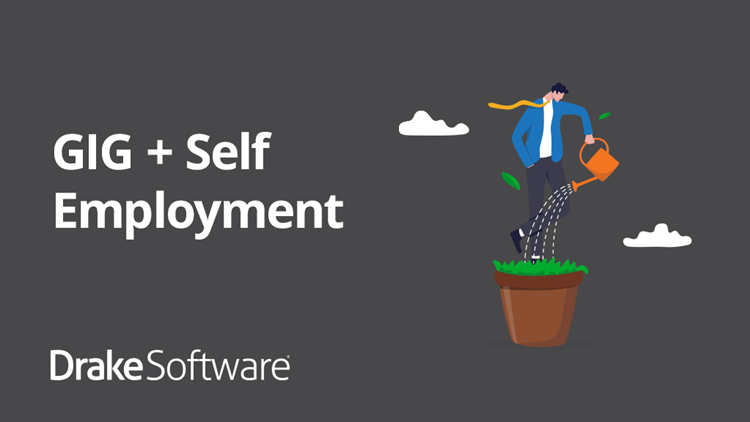Taxes for Gig Work: What Tax Pros Need to Know

In today’s ever-expanding freelance economy, more Americans are working outside traditional employment. Whether it’s delivering meals for DoorDash, creating content on YouTube, or driving for Uber, this growing pool of gig workers brings new challenges for tax professionals — especially with upcoming changes from the One Big Beautiful Bill Act (OBBBA).
Here's what you need to know to guide your clients who earn freelance income or work in the gig economy.
What Is Gig Work?
“Gigging” is a type of freelance work (officially referred to as independent contracting) that usually refers to short-term or project-based work arrangements, often facilitated by digital platforms. Common examples include:
- Rideshare driving (Uber®, Lyft®)
- Food delivery (DoorDash®, Grubhub®)
- Online marketplaces (Etsy®, eBay®, Fiverr®)
- Payment processor income (PayPal®, Stripe®, Venmo®)
- Part-time or seasonal freelance services (writing, graphic design, tutoring)
These income streams are often reported through Form 1099 rather than a W-2, and that changes how the income is taxed — and how it should be reported.
Gig Economy Trends: Why It Matters Now
According to recent IRS trend reports, gig economy participation continues to rise, with more than 16% of U.S. adults reporting some kind of freelance income. Platforms like PayPal and Stripe are making it easier than ever to earn side income, which means more taxpayers need help understanding their obligations.
For a deeper dive into recent tax trends, check out our free guide analyzing tax year 2025.
OBBBA: Major Changes Ahead for Freelancers, Including Gig Workers
The One Big Beautiful Bill Act introduces key provisions that could reshape freelance tax planning:
- New 1099-K Thresholds: OBBBA adjusts income reporting thresholds for third-party platforms. This means more gig workers will receive a 1099-K — even if their earnings are relatively modest.
- Tip and Overtime Deduction: Beginning in tax year 2025 (filed in 2026), workers can deduct up to 25,000 dollars of tip or overtime income from their federal taxable income. This provision is especially impactful for service-based gig workers.
These changes require tax pros to educate clients early and help them prepare to track and categorize income properly. Learn more about 1099-K guidance.
How Are Gig Workers Taxed?
Gig workers are usually classified as self-employed, which makes them responsible for the self-employment tax, currently 15.3% (12.4% for Social Security and 2.9% for Medicare).
Many taxpayers are unaware that they need to make quarterly estimated payments if they expect to owe 1,000 dollars or more in taxes when filing. Failing to do so can result in penalties.
Who Qualifies as a Gig Worker?
Worker classification continues to be a hot topic — and a compliance trap. Because employees and freelancers are taxed differently, misclassifying an employee as a gig worker can result in fines, back taxes, and audits.
A range of factors go into determining employee or freelancer classification, and these fall into three main categories:
- Behavioral Control: Does the company direct what the worker does and how the work is performed? The more control the company exerts over day-to-day tasks, the more likely the worker is an employee.
- Financial Control: Who manages the business aspects of the work? Consider how the worker is paid, whether expenses are reimbursed, and who provides tools or supplies. A worker with greater financial independence typically leans toward contractor status.
- Type of Relationship: Are there written contracts or benefits such as health insurance, retirement plans, or paid time off? Does the relationship seem ongoing, and is the work integral to the business? These factors may point toward an employment relationship.
No single factor determines classification on its own, so the best practice is to evaluate all relevant factors, recognize that some may carry more weight than others depending on the situation, and document the reasoning behind the final determination.
Tax professionals should review how their clients are being paid, note the level of control exercised by platforms or clients, and seek legal advice as needed.
Tax Forms for Gig Work
Taxpayers with gig or freelance income should be familiar with the following forms:
- Form 1099-NEC – For nonemployee compensation.
- Form 1099-K – For third-party payment platform transactions.
- Schedule C (Form 1040) – To report income and expenses from self-employment.
- Schedule SE (Form 1040) – To calculate self-employment tax.
- Form 8829 – For home office deductions (if eligible).
Pro Tip: Minister Taxes as a Special Case
Ministers and clergy can sometimes be categorized as self-employed for federal income tax purposes, while still being considered employees for other benefits. They often have to pay self-employment tax on housing allowances or stipends, making them a unique gig-work-adjacent group tax professionals should be aware of.
Support Your Freelance Clients with Drake Software
With new legislative changes, it's more important than ever for tax professionals to proactively guide clients with gig income. From planning for self-employment tax to staying current on 1099-K requirements, your expertise can help clients avoid surprises come tax season.
Drake Software has resources to help you support clients in the gig economy:
- Comprehensive Pro Tax Software: Equip your office with professional tax preparation software that provides fast calculation results, hundreds of accuracy checks, and customizable program options.
- Award-Winning Customer Service: Rely on our expert support for quick, friendly assistance whenever you need it.
- Simple, Flat-Rate Pricing: Browse packages designed to support tax professionals of any kind, from solo preparers to multi-site tax preparation businesses.
Ready to get started? Join us for a webinar introduction, take a guided tour with a free seminar, or download a free trial of Drake Tax today.
Disclaimer: All product names, logos, and brands such as Uber, Lyft, DoorDash, Etsy, eBay, Fiverr, PayPal, Stripe, and Venmo are the registered trademarks of their respective owners. Any use of these names is for identification and reference purposes only and does not imply any endorsement, affiliation, or sponsorship.



